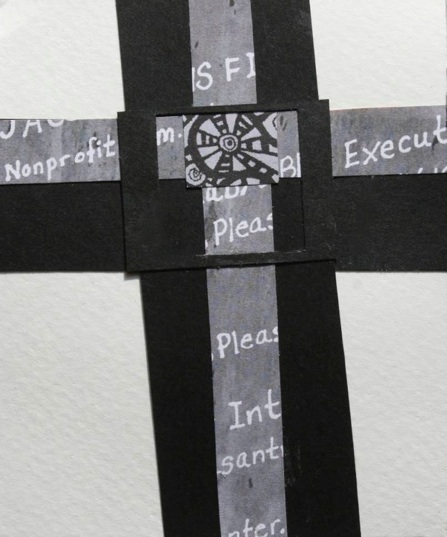
–
Every year for the past thirteen years I have given a sermon as part of our clergy association’s three hour community Good Friday service. Usually we each comment on one of Jesus’ seven last words, or the eight stations of the cross. This year we chose to do something different and split up the story from the gospel of Luke. I was to discuss Luke 23:1-12 within a twenty minute time slot that included one of our church members reading the passage, followed by my comments below, and concluding with our soloist singing Mary Baker Eddy’s hymn Saw Ye My Savior. Below is what I said:
∞∞∞∞∞∞∞∞∞∞∞∞∞∞∞
The passage just read in Luke doesn’t include the entire interview between Pilate and Jesus as is seen the rest of the New Testament, so let’s consider this bit of the story across all four gospels.
The chief priests bring Jesus before Pilate and accuse him of many things, all of which were derisive lies designed to incite a verdict of blasphemy and to cause political insecurity. They mention him as stirring up the people, a disturber of the peace, and a causer of political agitation – when in reality he brought healing and calm, respect and consideration, reconciliation, reassurance, and attention to spiritual ways and means. They said he was a meddler in money matters – forbidding payment to Caesar – when in fact he instructed coins to be taken from a fishes’ mouth to obediently pay his taxes while admonishing to others “render unto Caesar the things which are Caesar’s, and unto God the things which are God’s.” And they said he was aspiring to human power, claiming to be a King – but when Jesus had been asked during his ministry who he was, he usually demurred or circumvented the question with another question. All these fallacious accusations were deliberately calculated to bring condemnatory action. They had no basis in truth.
Pilate receives Jesus, taking little heed to the allegations; he is not impressed with the validity of the charges. Three times Pilate protests those claims and asserts instead that Jesus is innocent.
But Pilate is puzzled by this unusual case and wants to do his duty, so he asks Jesus, “Art thou King of the Jews?” Jesus explains that his kingdom is not of this world, so he is not a king in the way that Pilate means. Then Pilate asks Jesus, “What hast thou done?”
And Jesus responds by revealing the reason he was born: “for this cause came I into the world,” he said, “ that I should bear witness to the truth.” This assertion should secure more notice than it usually does, because many Christians declare that Jesus’ mission was to save sinners, yet it was more than that. Here Jesus himself states clearly that his purpose is to bear witness to Truth.
To this pronouncement Pilate says, “What is truth?” and immediately turns away to the crowd. Does Pilate shrug and sigh and mutter when he retorts that, or is he aggravated? What is Truth anyway?
Jesus’ famous saying, “You shall know the truth and the truth shall make you free,” is quoted in large letters on the front wall in our church auditorium here on Main Street in Ridgefield.
In Christian Science, the word Truth is a synonym for God, infinite, ever-present, intrinsic and powerful. Truth not only makes man free, it confers harmony, has a healing effect, and is a potent remedy. Truth is natural and honest, poised and substantial, active and right. It is all-inclusive, infallible, consistent and firm, stable and helpful. It nourishes and sustains us. Truth is liberating while obeying law; it is applicable and affirmative, like light casting out darkness. Truth perpetually conveys itself, communicating good, and constantly speaks to everyone in a way they can understand.
Could Pilate have been immune to the fact that before him stood the Christ, the exemplification of Truth itself? I think not.
I have wondered, however, whether the truth was the same to Pilate as it was to Jesus. Even though one may have been looking for a meager relative truth while the other was embracing the vast brilliance absolute Truth, none of us can escape unchanging Truth itself.
It was the ongoing acknowledgement of absolute Truth from God’s benevolent perspective that enabled Jesus to heal the multitudes and to get through the ordeal of the crucifixion with the grace that he did. He trusted in God’s goodness and beneficence.
Throughout his ministry, Jesus saw a perfect God-like man, where others saw sinning or sick mortals, and it was this perception of ultimate Truth instead of accepting merely material appearances, that healed and saved.
What we now call Good Friday would put Jesus through an excruciating set of circumstances, which would prove this habitually inspired outlook could be victorious in every situation. And if we wish to follow Jesus and have him as our way-shower, we too, are to routinely see others from this liberating standpoint as well.
Pilate discerned the truth of Jesus’ innocence, but he was unable to look away from the clamor of the crowd and the vehement insistence on the behalf of error instead of Truth.
And does it matter anyway if someone else doesn’t comprehend what our Truth is? Divine Truth is paramount and omnipotent and will eventually and finally be victorious. Jesus knew this, and we all can as well. Meanwhile, who each of us are screams louder than anything we can say.
So Pilate, upon learning that Jesus is a Galilean, realizes he has an excellent excuse to rid himself of this responsibility by referring Jesus to Herod, who happened to be in Jerusalem at the time, and whose jurisdiction Jesus was actually under.
Herod, who has been described as “a cunning politician, a cynic and a sensation monger,” was initially enthusiastic about meeting Jesus, whom he had heard so much about. He was desirous of seeing Jesus do some kind of a miracle. Herod questioned Jesus at length, but Jesus said nothing; who Jesus was came through louder than anything he could say, and that was true of Herod as well. Herod’s menace quickly surfaced when Jesus did not pander to him, and Herod quickly joined his soldiers in treating Jesus with contempt and mocking him.
How often do we remember that innocence is power? Daniel in the Lion’s Den proved that. The truth about adversity is that every one of us will find our selves in unpleasant, trying and unjust experiences, but as Jesus was knowing when he stood before Herod, divine Love with not leave us comfortless. The liberating light of Truth will be both seen and felt.
The last bit of our reading is the only reference to former enmity between Pilate and Herod, but I find it interesting that their coming together was predicted in Psalms 2:2, which says, “the rulers take council together, against the Lord, and against his anointed.” With similar foreshadowing, I feel Jesus’ statement about coming to bear witness to Truth prefigures what was to happen a few days hence on Easter morning. Easter is about the exultant freedom experienced and understood when Truth is revealed. What remains is for us to practice it.
–






